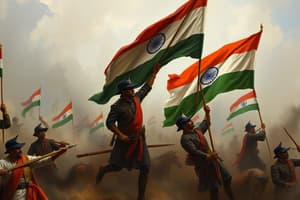Podcast
Questions and Answers
Which form of warfare has national movements used to challenge conventional military forces?
Which form of warfare has national movements used to challenge conventional military forces?
Guerrilla warfare.
What role did nonviolent resistance play in national movements?
What role did nonviolent resistance play in national movements?
Nonviolent resistance has been a key tactic employed by national movements throughout history.
Which key leader was a prominent figure in the struggle against apartheid in South Africa?
Which key leader was a prominent figure in the struggle against apartheid in South Africa?
Nelson Mandela.
Who is often referred to as the 'Liberator of South America'?
Who is often referred to as the 'Liberator of South America'?
What significant outcome have national movements achieved?
What significant outcome have national movements achieved?
How have national movements impacted societies in terms of fostering national identity?
How have national movements impacted societies in terms of fostering national identity?
What role did political theories like liberalism and nationalism play in the emergence of national movements?
What role did political theories like liberalism and nationalism play in the emergence of national movements?
How did national movements impact economic growth in nations striving for independence?
How did national movements impact economic growth in nations striving for independence?
What historical events and movements influenced the emergence of national movements around the world in the 19th century?
What historical events and movements influenced the emergence of national movements around the world in the 19th century?
What are some of the key consequences of national movements on societies?
What are some of the key consequences of national movements on societies?
Flashcards are hidden until you start studying
Study Notes
National Movements: Shaping Societies and Transforming History
National movements, often referred to as independence or liberation struggles, have significantly influenced the course of human history. These grassroots initiatives aim to establish or solidify a nation's political, economic, and cultural independence, ultimately leading to profound changes in society.
Historical Background
National movements emerged throughout the world, particularly during the 19th century, as a response to colonialism and the desire for self-determination. They often aligned with political theories that emphasized the rights of individuals, such as liberalism and nationalism. From the American Revolution and the French Revolution, to the independence movements in Latin America, Asia, and Africa, these movements continue to shape our global landscape.
Impact on Society
National movements have brought about a range of consequences for societies, including:
- Fostering national identity: By uniting people behind a common cause and vision, national movements strengthen a sense of national identity, often leading to increased cohesion, unity, and pride among citizens.
- Promoting economic growth: As nations gain autonomy, they can take greater control over their economies, allowing them to make strategic decisions that prioritize economic development and social welfare.
- Addressing social and economic disparities: National movements have highlighted and sought to address longstanding social and economic disparities, such as those based on race, ethnicity, religion, or gender, leading to greater equality and justice.
- Encouraging political reform and democracy: National movements often lead to the establishment of new political systems that are more representative and accountable to the people, promoting the principles of democracy and human rights.
Strategies and Tactics
National movements have employed a variety of strategies and tactics to achieve their goals, including:
- Nonviolent resistance: Capable of successfully challenging even the most powerful regimes, nonviolent resistance has been a key tactic employed by national movements throughout history.
- Guerrilla warfare: This form of asymmetric warfare has been used by national movements to challenge conventional military forces, including the Viet Minh's resistance against the French in Vietnam and the Mujahideen's fight against the Soviets in Afghanistan.
- Diplomacy and international advocacy: National movements have often sought to gain support and recognition from the international community, using diplomacy and international advocacy to strengthen their cause.
- Cultural and educational initiatives: National movements have used cultural and educational initiatives to promote awareness, unity, and pride among their populations, including through music, literature, and other forms of expression.
Key Leaders
Some of the most notable leaders associated with national movements include:
- Simón Bolívar: Often referred to as the "Liberator of South America," Bolívar played a pivotal role in the independence movements of Venezuela, Colombia, Panama, Ecuador, Peru, and Argentina.
- Nelson Mandela: A prominent figure in the struggle against apartheid in South Africa, Mandela was a key leader in the movement for racial equality and social justice.
- Martin Luther King Jr.: As a leader of the American civil rights movement, King played a critical role in promoting equality, justice, and nonviolent resistance.
- Indira Gandhi: As India's first female prime minister, Gandhi played a crucial role in consolidating India's independence and leading the country through various national movements.
Achievements
National movements have achieved a range of significant outcomes, including:
- Independence: National movements have been successful in achieving independence, leading to the creation of new sovereign nations throughout the world.
- Democracy and human rights: National movements have promoted the principles of democracy and human rights, leading to greater political representation and social justice.
- Economic growth: National movements have fostered economic growth, leading to increased standards of living and development for millions of people.
- Social and cultural unity: National movements have strengthened national identity, fostering greater unity and cohesion among citizens.
National movements continue to shape our world, with new movements emerging to address ongoing challenges and injustices. By examining the historical contexts, strategies, and achievements of these movements, we can better understand the forces that have shaped our global landscape and continue to shape our future.
Studying That Suits You
Use AI to generate personalized quizzes and flashcards to suit your learning preferences.




